
I recently asked Peter Rosch about his time at UT and how he switched from being an AD to a CW. He also talks about how crucial it is to have a good partner. He is currently an Executive Creative Director at Lowe in New York City. And you know those ESUVEE ads that everyone was talking about in 2004-2005? Well, Peter certainly does; his partner, John Hobbs, and him created those.
brief biography taken from UT advertising homepage
"After graduating from the University of Texas in 1995, Rosch first went to work for Young & Rubicam as a Junior Art Director. At Young & Rubicam, he was promoted to Senior Art Director, but he eventually left to work at the Cartoon Network, Kirshenbaum Bond & Partners and BBDO. He has been both a copywriter and an art director. Rosch moved to J. Walter Thompson (JWT) in 2000 where he met his partner, John Hobbs, an art director from Detroit. They left JWT to freelance and then moved to permanent positions at Bartle Bogle Hegarty (BBH) after starting to work on the Levi’s account.
Rosch and Hobbs have been a successful team, creating the Levi’s spot “Dangerously Low” that won silver and bronze Clio Awards. Their “Atlas Bakery” spot was recently place in the Museum of Modern Art as part of the permanent collection, something Rosch considers the highlight of his year and perhaps his career..."
How did you get into advertising?
I took the intro to advertising class as an elective. A friend of mine had taken it, and he loved it but didn't get the grade to move forward. He was taking it again, and i needed an elective. At that point I was two years into school, and had changed my mind on majors multiple times. I enjoyed the class very much, and needed to major in something to get my mom and dad off my back, so I picked advertising – but only after I made the creative sequence.
I toyed with being a photography major, and might have done so had I not made the sequence. Even after picking it as a major, I don't think I really thought I’d actually go straight into it after school. But after visiting New York on the Spring Break trip (with Texas Advertising Group-TAG? ), I fell in love with the city, and advertising seemed like the quickest way to get there.
Who did you have for portfolio classes? Has Deb's hair always been "reddish"?
I had Jack (can't remember his last name), Patricia Alvey, and Deborah. I don't recall it being reddish back then, but that was a long time ago.
Do you miss Austin? Do you miss Texas?
I love to visit Austin, and the rest of Texas, but truth be told I don't miss it much. I miss my immediately family who all still reside there. I could see living in Austin again someday, but probably not until I retire. I miss the food in Austin. New York has some great restaurants, but there's nothing here like The Salt Lick, Trudy's, Texadelphia, etc.
I miss the warmth, as New York is cold for a good part of the year. Even so, I have so many great friends here, and I enjoy the energy and opportunities that New York offers.
How did TX Creative and UT prepare you for a career in advertising?
Well, at the time, you pretty much worked as art director and copywriter on all your own stuff. Pairing up wasn't really encouraged. I think this helped and hurt. It helped me develop skills in each, and an appreciation for what it takes to be either, but it hurt me when it came time to work with others. I was really confident that I could do both, and wasn't that cooperative with partners at first. The University’s reputation in the business, and the network of Texas Exes was certainly helpful.
A big part of getting a job is connections. Remember everyone you talk to or meet, and use any connection you have to get that first break. It might feel like you are being a pest, and you are, but everyone is used to it. And anyone worth talking to will remember how it felt to be looking for that first job, and should give you some time.
You've worked at Y&R, Cartoon Network, Kirschenbaum Bond & Partners, BBDO, JWT, BBH and now Lowe. I would assume that each agency has it's own unique culture. For example, because BBH is British they might have a different slant on things. Also, agency size also affects things. Can you talk about this?
It would take me a while to answer this completely. They have all been different for sure; take Cartoon Network out of the mix though and there would be one thing the others all have in common: it took a lot of things to happen (luck, a client in a good mood, an account person willing to fight, a creative director who didn't want to sell his own stuff first, and so on) to get a great idea bought, and produced. There are many obstacles in the way of ideas, I suspect there has always been, but it seems to me that everyday someone creates a new title or test, or layer that makes getting an idea through the process that much harder. BBH was smaller than the rest, but it was still a very rigorous process to get an idea bought and produced.
Why do you think the turnover rate (switching jobs) is so high in the advertising industry?
I think creative people need change. You need new surroundings, and opinions, and faces to keep fresh. Or it could be because it's the easiest way to climb the ladder in title and salary. It’s probably a little of both.
Having a great coworker/partner is crucial in advertising. And you've, obviously, found a great partner in John Hobbs. How did y'all (Texan for you + all) "click"? What makes a good creative partner?
John Hobbs is a god to me. Not a day goes by that I don't thank my lucky stars to have him as my partner and friend. And it is important. Working with someone that you don't quite mesh with, makes life miserable. I say life, because it is more than work. In this business you see your partner a lot, more than your friends, spouse, girlfriend or boyfriend. I'd put it at roughly 70% of the hours in a week. It's sick when you think about it too hard. I don't know if there is anything black and white about what makes a good creative partner. For John and me it has been mutual respect for what each brings to the table - talent, hard work, and a healthy dose of hatred for many aspects of this industry.
A lot of students face the "Am I a CW or an AD?" dilemma. How did you figure it out?
I left as an Art Director. My first job was as an Art Director. In numerous interviews with agencies here and in San Francisco I was told that my writing was very good, and asked if I had considered being a writer. I just didn't want to do it. I liked writing, but I really like the control an Art Director has over the final product. My first partner, Darren Wright, is an excellent writer with no ego. He let me write a lot of the time, and after a while, I just realized that I enjoyed writing more. Truth is you end up doing a little of whichever you aren't anyway - if that makes sense. There is one other factor in my decision to switch - ART DIRECTORS PUT IN WAY MORE HOURS THAN WRITERS. You spend all this time trying to concept the idea, and then someone approves it, and there's maybe a day to get it ready for the meeting, and the Art Director now has that responsibility. I've always tried to help John as much as I can, but in the end, he still puts in way more actually hours. It's just the nature of that position.
Is it hard going from Jr. Art Director to Executive Creative Director? What new challenges/responsibilities does being an ECD entail?
It was hard I guess. I've never really though of it that way. I took a lot of leaps when others advised me not to, and I think every time I did it worked out for the best. It was very difficult to leave BBH, because it is a great place to work, we were doing great work, and we had some incredible friends, but again - we needed a new scene, and I was really drawn to the challenge of being the ECD of a New York agency with a lot to prove. The biggest challenge so far has been finding time to do actual work. You can lose yourself in meetings at any level in this business.
For lots of people having meetings is their work, so they don't have any reason to keep it under thirty minutes, but as a creative you just want to get back to thinking about ideas. So, the many demands on our time have been challenging, but I really love it.
I read that "The Esuvee campaign has drawn the ire of SUV enthusiasts, who are suspicious of its lawsuit-inspired origins, and SUV critics, who say it glamorizes the problem without getting to its root." Can you talk more about the Esuvee campaign? How did the idea of it come about?
Well, I thought it was a pretty complicated subject, so i wasn't surprised to be attacked from both sides. I think we did a great job of talking to the target about driving safer, without preaching, or using scare tactics. Our clients, who were incredible by the way, were all lawyers - District Attorneys from eight different states. They had enormous cajones to go with that idea. They could have done something very safe, that both sides would have ignored, and our target would have ignored it right with them. I still marvel at all the links the word "esuvee" gets on Google.
click on image to enlarge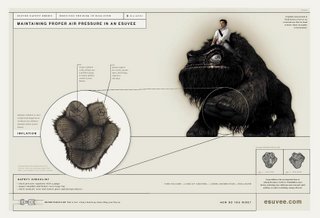
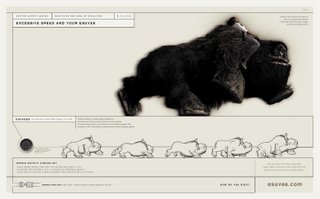
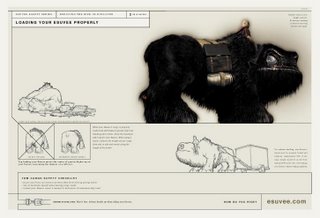
Your "Atlas Bakery" TV spot for Levis, is in the Museum of Modern Art's (NYC) permanent collection. You've also won Cannes, CLIOS and other awards for Miller and Levis. Of all the work you've done, what are your personal favorites?
I think the work we did for Axe Dry with Pitman was probably my favorite. It never won a damn thing, but it always makes me and john laugh, and it was a huge challenge to get that campaign sold. Never was quite sure why it didn't win anything. It was quite polarizing to the public, so i assume that it was equally polarizing in the jury rooms. But, we produced and moved something like 20,000 Armpit Keychain Toys, and it was available on eBay, and written about by some people who hated it by major publications. That response far outweighed winning anything.
click on images to enlarge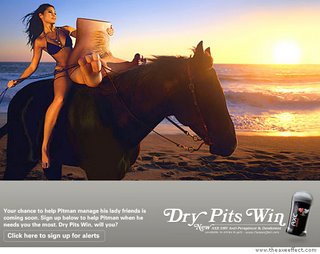
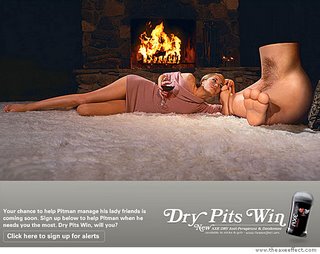

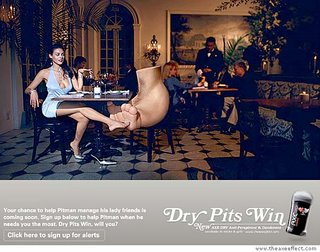
What's your personal creative philosophy?
Fear. Lots of people are going to see what you do, and you don't want it to suck.
What's your top ten list of advice for Jr. ADs and Jr. CWs?
(in no particular order)
1. Hold out for the job you want.
2. If you can't get it take one somewhere, and get in the biz (don't keep working at chili's and living at home.)
3. Meet everyone you can, and don't forget them.
4. Investigate where you are going to take a job - who is your boss, what has he done that makes you think you'd like to work with him, and who will you be working with.
5. Bust your ass, but make time for something outside of advertising or you'll burn out.
6. Your mom and dad do not understand this business, so don't get frustrated when they hate you for not taking a job at Grey.
7. Accept that this is a business and not Art, but push to make it more like Art everyday.
8. Don't ever stop trying to make your book better, but only listen to people whose work you admire.
9. Invest in your 401K the minute the company lets you!
10. And finally, invest in your 401K the minute the company lets you!
What does one need to do to sustain a career in advertising and not burn out?
Remember to live a life outside of advertising. Not as easy as it sounds.
How do you get over mental blocks?
I walk a lot. If that doesn't work I drink. If that doesn't work I see a movie. If that doesn't work I ask John for an idea. If that doesn't work I run a brief by my mom. If that doesn't work ignore it.
I've experienced and heard that advertising is a learn-on-the-job business. For example, getting work approved through multiple levels is an eye-opening process. But at the same time Tx Creative prepares you by helping build a sound strategic thinking foundation. What else can a portfolio program do to help prepare students?
If I knew I'd open my own portfolio program.
What was the best advice given to you?
Best advice was from John Hegarty who told me "to come in late and leave early" when it comes to storytelling. He was totally right, but until he said it, i didn't notice that most of my favorite things did exactly that. In other words, it can be a lot more powerful to let the viewer fill in the blanks. You can find our spot for Levi's French Dictionary (it stars Gael Garcia Bernal of The Motorcyle Diaries fame) on youtube.com as an example of this. As a viewer you get what's happening, but you watch and wonder what must have happened before, and the "what will happen next" is left to the viewer's imagination too. It's like a good horror flick, you don't have to show somebody what happens when you take a chainsaw to a person's midsection - a viewer's imagination will probably do a way better job of making them squirm.
What is some work out there today that you really like?
Right now I am absolutely in love with the adicolor short film, pink - written and directed by Charlie White. I'm not sure where you can find it, but you should. Honda's Grrr spot last year was everything a great ad should be, and then some. I never once grew tired of watching that spot. That is very very hard to accomplish.
adidas- adicolor: Pink
adidas- adicolor: Blue
adidas- adicolor: Green
Mark Wnek has really assembled an all-star Creative team at Lowe with you, John Hobbs, and Fernanda Romano. What do you foresee for Lowe? Does Fernanda (she's Brazilian) ever rag on Americans about the World Cup?
What do I foresee for Lowe? Nothing less than world domination of course. Fernanda has dissed American beaches many times, but hasn't mentioned the World Cup once.
Here are some samples of Peter's print work and some screen grabs of the ESUVEE, Atlas bakery, and new work he's done at Lowe.
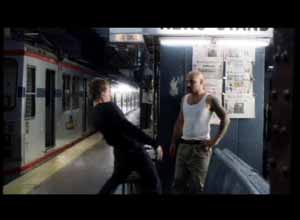
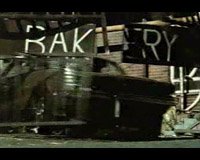


Sunday, April 23, 2006
Interview with Peter Rosch
Labels: advice
Subscribe to:
Post Comments (Atom)







4 comments:
I think he's just awesome, but then I'm his mother!
Great interview David!
Matt, very good interpretation of some very good advice.
I'm so proud of you! You turned out so cool! Who knew?
I, too, am proud of you Peter...and by the way, I knew you were going to do big things!
Trinity High Drum Corps
class of '89
Post a Comment